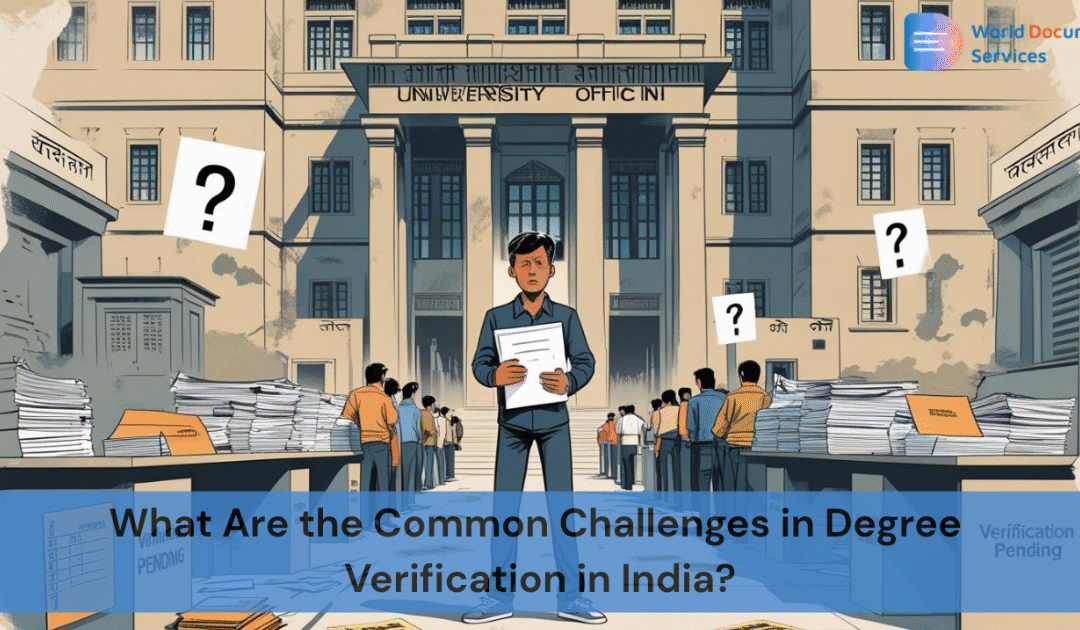
by World Document Services | Aug 11, 2025 | Document Verification
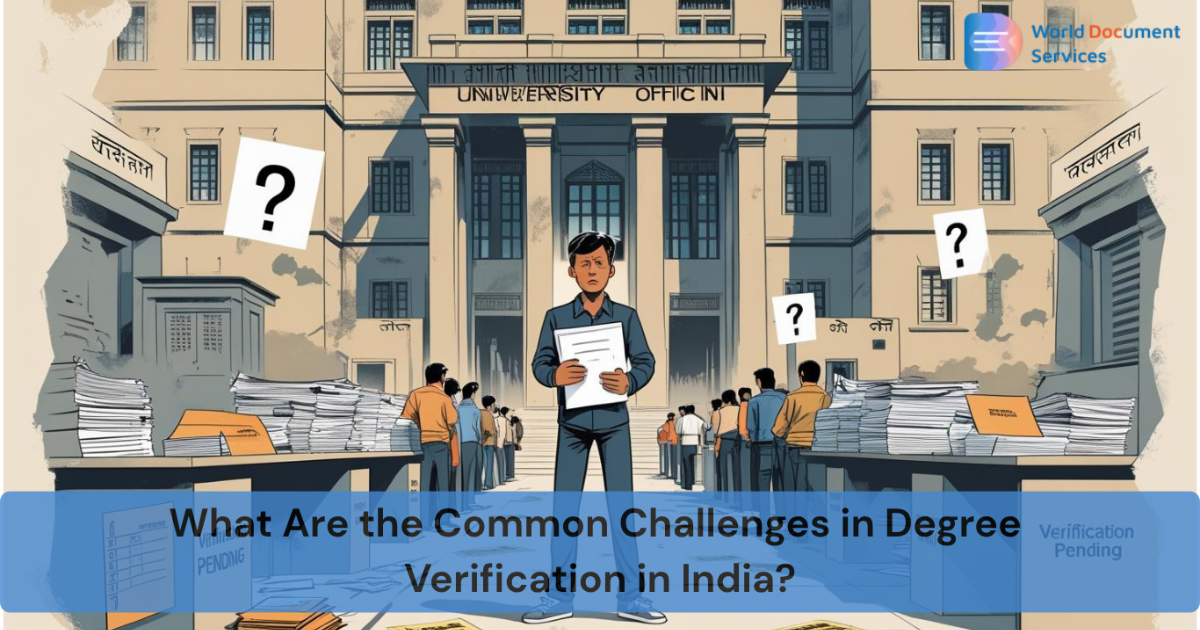
Degree verification is an important process in matters of migration, whether for employment or educational purposes. This is a lengthy process that involves multiple steps, starting from contacting the university to getting the entire process sorted, concluding it by getting your degree verified. However, this process is lengthy, has its own challenges, and creates many issues such as inaccuracies, errors, and delays, which often are a trouble to the applicant.
Need help with your Degree Verification? Contact Us Now!
1. Lack of a Centralized Degree Verification System
One of the biggest challenges in India is the absence of a centralized record system for academic credentials. With thousands of universities and colleges maintaining separate records, accessing verification data becomes cumbersome. Unlike some developed nations with unified academic databases, India’s fragmented system causes delays and inefficiencies. Establishing a centralized database would streamline the verification process, making it more efficient and accessible.
2. Manual and Paper-Based Processes
Many universities in India are still functioning on traditional paper-based record-keeping of documents or maintaining the records, which is now pretty outdated as well as less reliable. Keeping an outdated working pattern slows down the entire verification process, making it less reliable and error-free. Having a paper-based record increases the chances of misplacement and errors in the records.
3. Inconsistent Verification Procedures
The degree verification process varies and differs entirely from university to university. Some institutes have a traditional way of bookkeeping, while others have a modern one. Some universities do not have a predefined process for a degree; some have methods that one can follow and obtain. This inconsistency leads to delay, and only proper planning can help you avoid this delay.
4. Delays in Response from Universities
A common issue in academic credential verification is the prolonged response time from universities. Due to multiple drawbacks and inefficiencies, understaffed departments, and administrative bottlenecks, it can take weeks or even months to process verification requests. These delays can negatively impact job opportunities, admission timelines, and visa applications.
5. Forgery and Fraudulent Degrees
Fake degree certificates and fraudulent academic claims are widespread in India. Many individuals attempt to avoid verification by presenting fraudulent documents. This has made it essential for organizations to implement a strict degree verification process. Figuring out the genuine credentials from fraudulent ones still remains a challenge, especially when universities lack a transparent and uniform verification system.
6. Limited Digital Infrastructure
Some universities, along with time, have developed and started to maintain the digital verification method, while others are still enticed by the traditional paperback method of verification. In the absence of digital methods and uniform methods, many individuals are forced to rely upon postal communication, which is also inefficient and makes the entire process a hassle.
7. High Verification Costs
The cost of verification again is similarly a barrier for individuals and organizations, as these universities have varied and scattered fee systems. Some institutes charge the fees for verification along with the application of transcripts, while others consider it an individual cost. The verified degree to be sent to a domestic address or to an international employer is also a point where the cost will differ.
8. Complexity in Verifying Foreign Degrees
For Indian students who have studied abroad, verifying foreign degrees can be even more complicated.
Validation from international institutes for the student who has followed the Indian educational system. Lacking a uniform system makes the entire process lengthy and creates a long waiting list and waiting periods.
9. Limited Awareness and Guidance
Many students and professionals planning to move abroad and are planning to pursue their career ahead are unaware of the fact that there’s a step, such as degree verification. A lack of such information makes it difficult for one to understand the correct degree verification process and struggle to find the right one as well. Unclear guidelines from the university make it difficult for one to obtain the documents verified on time, as well as make the process complicated.
10. Data Privacy and Security Concerns
With increasing digitization, data security is a major concern in academic credential verification. Universities and verification agencies must ensure that personal and educational data are protected from cyber threats and unauthorized access. The risk of data breaches or misuse of sensitive academic records discourages institutions from fully adopting digital verification methods.
Solutions to Improve the Degree Verification Process in India
While challenges persist, several measures can enhance and streamline the degree verification process:
- Centralized Database: A common database for academic records would simplify verification and reduce inconsistencies.
- Digital verification methods: Universities must start to use blockchain-based verification systems to enhance efficiency and reduce fraud.
- Verification Procedures: Establishing a uniform verification process across all universities will create transparency and accessibility.
- Automation and AI Integration: Leveraging AI-driven verification tools can help detect fake degrees and speed up the record retrieval process.
- Awareness Campaigns: Educating students and employers on the correct verification procedures can reduce errors and miscommunication.
How World Document Services Can Help
For individuals and organizations looking for a streamlined verification process, professional degree verification services can be highly beneficial. We at World Document Services help you in obtaining and verifying academic credentials efficiently, minimizing delays and ensuring authenticity with reliability. With expertise in handling verification requests, we help navigate the complex procedures and provide reliable solutions for academic record verification.
Download the World Document Services App.
You may enjoy a hassle-free experience by downloading our mobile app from either the App Store or the Play Store. It works with both iOS and Android devices.
Conclusion
Degree verification in India is a complex process with multiple challenges, including inconsistent procedures, delays, high costs, and fraudulent degrees. While steps are being taken to improve the system, more effort is required to standardize and digitalize the verification process. By adopting centralized, secure, and efficient verification methods, India can enhance the credibility of its education system and facilitate smoother verification for individuals and organizations alike.
FAQ:
Q: Why is degree verification important?
A: It helps the employees and educational institutions to ensure that the documents submitted by the individual are authentic and are shared by the university itself.
Q: How long does the degree verification process take in India?
A: It varies depending on the university. If the documents submitted are correct, it can take weeks or months to years if there are any errors.
Q: How can I verify my degree from an Indian university?
A: Both online and offline models are available. But if you are present in the same city as your university, it is suggested that you visit and attempt to get verified.
Q: What are the costs associated with degree verification?
A: Cost entirely depends on the number of copies applied. Mode of application, i.e., online or offline, expedited or normal. The cost may vary as per your requirements.
Q: Can fake degrees be detected?
A: Yes, rigorous verification processes can help identify fraudulent degrees.
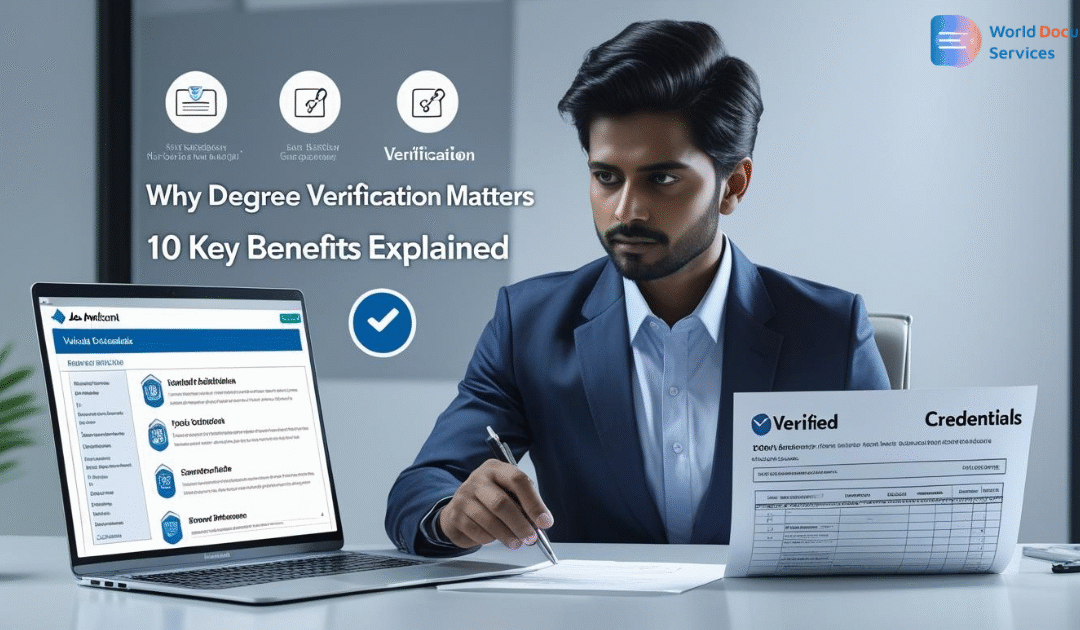
by World Document Services | Aug 4, 2025 | Document Verification

In this generation and era of professionalism, ensuring the reliability of potential employees has become a challenge. Organizations have their focus mostly on ensuring that the employees they hire are most qualified for the role and are reliable for the organization. University degree verification is an important step in ensuring that the organization doesn’t hire any underqualified candidate who can affect the reputation of the organization or is a resource of no use. This step protects the organization from fraudulent claims while also ensuring the integrity of the recruitment process.
Need help with your University Degree Verification? Contact Us Now!
1. Confirms the authenticity of educational credentials
For the matter of the accuracy of degree certificates to evaluate an applicant’s qualification. Fake documents or unverified documents are not very uncommon, and verifying one’s credentials ensures that they have genuinely earned their degrees and certificates. This step helps in hiring individuals with accurate qualifications and ones that organizations can rely on.
2. Reduces the risk of fraudulent hiring
Fake educational credentials have become very common in recent days. As there are rising cases of fake degrees and certificates, it becomes difficult for one to just rely on documents that are available. An effective educational verification process helps employers to hire better employees, and with it, they can authenticate the documents as per the requirement without compromising the hiring process.
3. Ensures compliance with legal requirements
Industries like healthcare, education, and engineering have very strict guidelines and compliance regarding the qualifications of any individual wanting to work abroad. Verifying the academic credentials helps organizations understand and check whether the applicant meets certain criteria, which are required for the job to be done.
4. Enhances workplace productivity
Hiring candidates with authentic qualifications helps to understand and ensure the skills required to perform the tasks being assigned. This contributes to fostering a healthy competition, which also enhances the overall productivity and efficacy of the workplace as a whole.
5. Protects the company’s reputation
Employees are the representatives of their employers and the organization they work for. Hiring employees with no solid background or without proper university degree verification can lead to scandals or affect the company’s credibility.
6. Helps Identify the Best Fit for the Job
The educational verification process is not just about filtering the candidates with unauthentic credentials, but also ensuring that the candidate who possesses the specific educational qualifications gets the role. This ensures that the job is aligned with the skills the job requires and the skills individuals hold. Making sure the one with authentic skills and fair means gets through the jobs.
7. Saves Time and Resources in the Long Run
It does seem time-consuming to get your educational credentials verified, but it saves the organization’s resources in the long term. Verifying the educational credentials and hiring people may seem like a challenging task, but replacing the resources with false information is even more challenging and costly. Hiring people based on their qualifications and verified credentials can prevent any such errors upfront, minimize employee turnover, and balance the cost associated.
8. Builds trust among employees and stakeholders
A company that hires through transparent means, including academic credential verifications, has built trust among its employees, clients, and stakeholders. This trust is important in a certain way, creating better coordination and a reliable work environment.
9. Prepares for International Hiring Standards
Hiring across the globe is a trend and isn’t restricted to just one place now, thanks to globalization. This makes degree certification even more important, as international documents might be difficult to validate without a structured verification process.
10. Mitigates Financial and Operational Risks
Loss of resources is a financial loss as well. In certain cases, it has been seen that people who are underqualified lead to financial loss, which can be in any form, such as project delays or operational mishaps. Specifically in industries like healthcare, inadequate knowledge can lead to severely unacceptable outcomes. Hence, university degree verification eliminates such risks by ensuring that the employees being hired must carry the required qualifications.
How the Education Verification Process Works
1. Candidate Consent
The process begins when the employer updates the candidate about the educational verification process and seeks approval to verify their credentials.
2. Document Collection
The collection of documents is the second step, which is either performed by the employer or the agency. They require copies of the degree certificate, transcripts, and other supporting documents.
3. Contacting Educational Institutions
To verify the documents and certificates, you must reach out to the respective educational institution to confirm the authenticity of the documents.
4. Verification Report
Once the entire verification is done, a report is generated mentioning all the data collected, and then it is either sent to the employer or used by them to make the final call.
Challenges in University Degree Verification
Academic credential verification is of the utmost importance; it comes with its own set of challenges. Which are as mentioned:.
Verifying educational credentials can be time-consuming, especially when dealing with international qualifications.
Some universities may be slow to respond to verification requests, which can cause delays.
The verification process may require the intervention of a third party and hence can add to the cost of verification as well as to the cost of recruitment.
Conclusion
University degree verification is an important part of today’s recruitment process. It is simply unavoidable, as it safeguards both employees and employers in their best interests. Majorly for the employers, it helps to avoid potential fraud, ensures compliance with industry standards, and protects their reputation, but also builds a foundation of trust for long-term success.
In a world where educational credentials are increasingly called into doubt, authentication is no longer optional but paramount when it comes to the degree certificate.
To obtain any assistance in regard to your educational document verification or to address any other questions regarding the same, you can contact World Document Services.
To get any support in your educational document verification or to resolve any queries related to the same, you can reach out to World Document Services. We are experts in the area of document procurement as well as getting it verified.
Download the World Document Services App.
You may enjoy a hassle-free experience by downloading our mobile app from either the App Store or the Play Store. It works with both iOS and Android devices.
FAQs:
Q: What is university degree verification?
A: University degree verification is a process of verifying the credentials and authenticity of the degrees awarded by the issuing institution to a candidate.
Q: Is international qualification degree verification possible?
A: Yes, there are many third-party verification agencies that can verify international educational qualifications to the requirements of the employer.
Q: How long does the education verification process take?
A: The time taken would again vary with the responsiveness of the educational institute and the complexity of the candidate’s qualification.
Q: Which challenges do employers face regarding the verification of degree certificates?
A: Most common challenges include long waiting times from unresponsive institutes, problems in checking old qualifications, and extra charges when a third party is opted to verify the degree certificate.
Q: How do candidates ensure smooth verification?
A: They must provide correct information, be available with their degree certificates at the time of request, and grant permission quickly when sought.
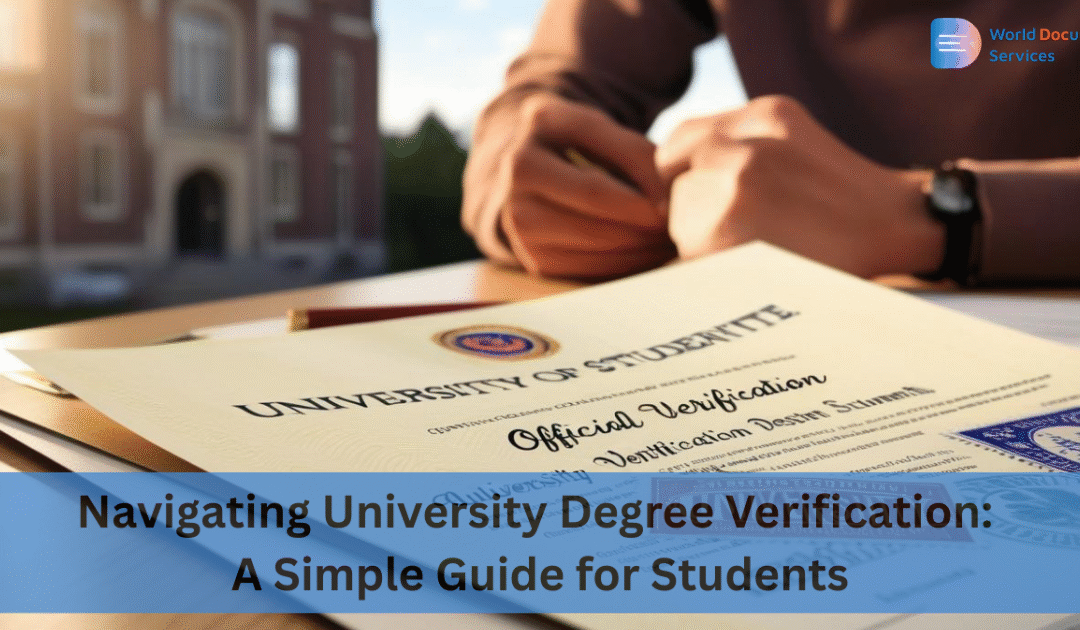
by World Document Services | Jul 10, 2025 | Certificate Attestation
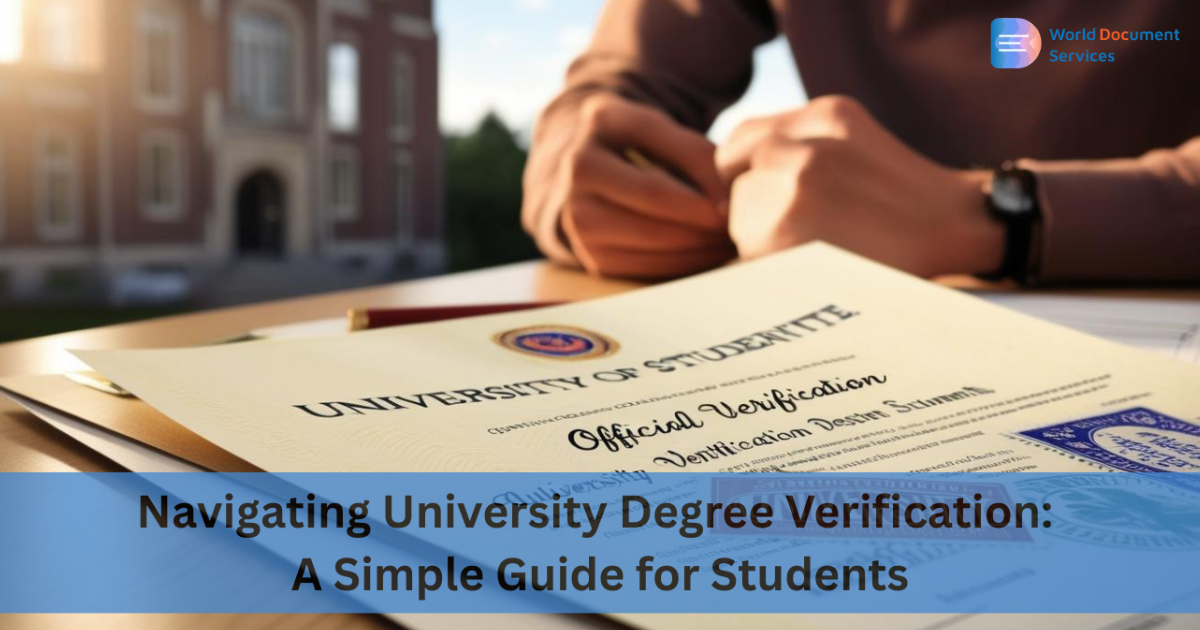
In the global academic and professional spheres today, credential verification is more than just a formality; it’s a necessity. It doesn’t matter whether you’re applying for postgraduate studies overseas, applying for a government job, or moving to another country to accept a job offer; university degree verification is a fundamental way of demonstrating your academic legitimacy.
This guide is meant to support you in understanding the degree verification process, explaining the criticality of verification of academic credentials, and demonstrating ways to expedite the verification process using online degree verification solutions. When you finish reading this, you’ll know what you are looking for, how to complete it quickly and efficiently, and how to avoid many of the common mistakes that delay or stagnate thousands of students from degrees each year.
Need help with your University Degree Verification? Contact Us Now!
What is university degree verification?
University degree verification is a formal process in which the educational institution authenticates a student’s degree or academic record; the rate at which verification occurs can vary. Verification can include authentication of a degree certificate, mark sheets, and all supporting documents issued by a university. Most verification comes from employers, embassies, verification agencies, or other educational institutions.
Why is it important?
With a digital age and competitive market, there are many fake degrees and fake educational records. Institutions and employers want to ensure that the documents you present are legitimate and issued from a certified entity.
Understanding the Degree Verification Process
The degree verification process generally follows these core steps:
- Submission of Application: Students or third parties (like verification agencies) must submit a formal request to the university along with necessary documents.
- Document Review: The university examines the submitted credentials to ensure they match their official records.
- Authentication and Endorsement: If verified, the university stamps or seals the document as “Verified” or provides a formal verification letter.
- Dispatch or Upload: In some cases, these documents are physically couriered to the requesting authority. Increasingly, however, this is done through degree certificate verification online portals.
This process can vary depending on the country, university, and the nature of the document.
Shift Towards Online Degree Verification
Many institutions and countries have shifted to online degree verification systems. These platforms allow students, alumni, and verification agencies to access secure databases that confirm educational records in real time.
Some prominent platforms include
- National Academic Depository (NAD) in India
- Digilocker Integration for University Certificates
- Student Clearinghouse in the United States
- WES (World Education Services) for international credential evaluation
- In-house university document verification portals managed directly by institutions
Benefits of degree certificate verification online include
- Faster turnaround time
- Digital and paperless transactions
- Reduced risk of lost or forged documents
- Secure access control
- Compliance with global verification standards
If your university is not yet online, you’ll need to rely on traditional manual processes.
What is Academic Credential Verification?
Academic credential verification is a broader term that includes verifying not just your degree certificate but also:
- Transcript/Marksheet verification
- Course completion certificates
- Medium of Instruction (MOI) letters
- Provisional degrees
- Revaluation letters (if applicable)
- And any academic documentation tied to your credentials
This step is vital when you’re planning to study or work abroad, especially in countries like Canada, the U.S., Australia, and Germany, which require credential equivalency evaluations.
How to Initiate University Document Verification
Follow these best practices to ensure smooth university document verification:
- Know the Requirement: Understand whether the end institution requires original verified documents, soft copies, or attested versions.
- Prepare Your Documents: Keep your degree, marksheets, ID proofs, passport copies, and application forms handy.
- Use Official Channels: Always request verification through your university’s registrar office or official website. Avoid third-party agents unless they are officially authorized.
- Track Your Application: If online portals are available, use tracking features. If not, maintain communication via email or phone with university personnel.
- Pay the Fees Promptly: Some universities charge a nominal fee for processing verifications or couriering documents abroad. Ensure you make timely payments to avoid delays.
Common Pitfalls to Avoid
- Incomplete Applications: Even a single missing document can delay the process.
- Wrong Authority Contacted: Always verify the designated contact point at your university.
- Procrastination: Initiate the verification process at least 1-2 months before your deadline.
- Not Cross-Checking the Format Required by the End-User: Some embassies or companies require sealed envelopes; others demand digital signatures.
Conclusion:
In the digital age, university degree verification is more accessible yet more critical than ever. Whether you’re dealing with academic credential verification for international study or online degree verification for employment purposes, a well-prepared and strategic approach can save you time, money, and unnecessary stress.
Always stay informed about your university’s verification mechanisms. And most importantly, treat your academic documents with the same level of seriousness as your passport or visa. They are your educational identity in the global marketplace.
Download the World Document Services App
You may enjoy a hassle-free experience by downloading our mobile app from either the App Store or the Play Store. It works with both iOS and Android devices.
Frequently Asked Questions (FAQs)
Q: How long does the university degree verification process take?
A: Typically, 10 to 30 working days, depending on the university and mode (manual or online). Delays are common during peak academic seasons.
Q: Can I verify my degree online if I graduated several years ago?
A: Yes, many universities offer online degree verification even for alumni. However, you may need to update your student profile or contact the registrar.
Q: Is notarization the same as academic credential verification?
A: No. Notarization only confirms your identity and the authenticity of the document copy, not the academic content or issuance by the university.
Q: Can I send verified documents directly to a third-party institution, or does the university need to send them?
A: It depends. For most embassy or credential evaluation agencies, the documents must be sent directly by the university in a sealed envelope or secure digital channel.
Q: What if my university doesn’t offer online verification?
A: In such cases, you’ll need to go through manual routes—submitting physical copies and using postal services or authorized agents recognized by the university.







 Call Us
Call Us Mail Us
Mail Us WhatsApp
WhatsApp
